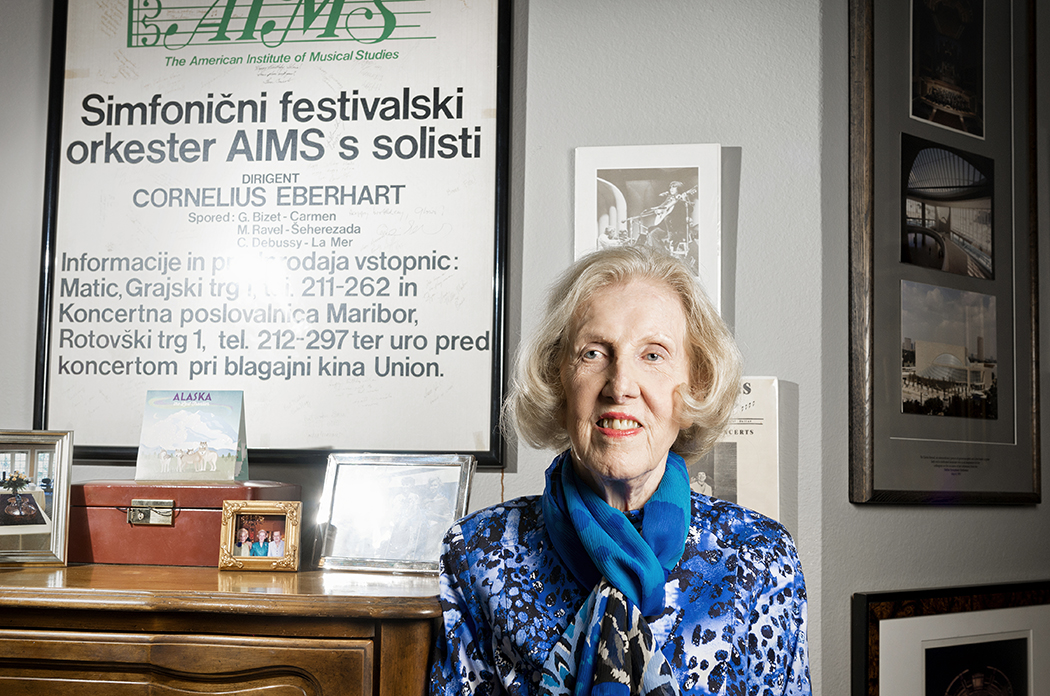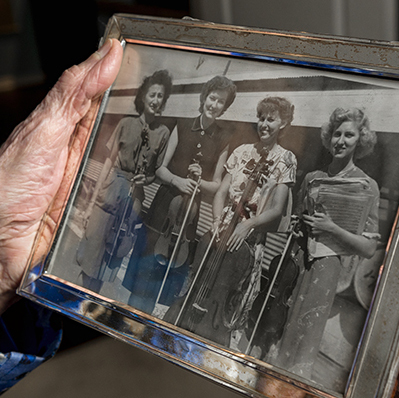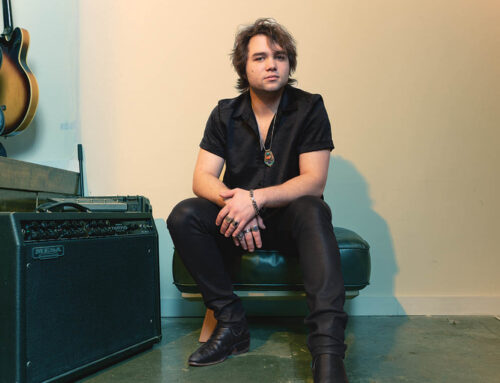
Gloria “Dode” Stroud. (Photo by Danny Fulgencio)
Ending on a high note
Longtime Preston Hollow resident Gloria “Dode” Stroud has spent her life making music. In a way, she’s spent her life following the music to see where it takes her — 96 countries thus far.
She was still a teenager when she was shipped off to the South Pacific as the violinist in the USO’s only string quartet. It was there on a tropical island where a chance meeting changed the course of her whole life.
“I met him for two minutes,” she smiles. “I quit Julliard the next day and moved to SMU to catch him.”
Impulsive was not a word many would use to describe Stroud — dedicated, disciplined or focused, maybe, but never impulsive. As a 5-year-old child in Cisco, Texas, her parents sought a strict music instructor, who would take students only after their parents agreed to follow a rigid rehearsal regiment.
“I had to get up an hour before school to practice, and then two hours after school,” Stroud recalls. “That was in addition to classes.”
But it paid off — Stroud was a natural with the stringed instrument, and some might even call her a prodigy. At 17, she got the chance to audition at The Julliard School, even though she lacked the music theory training that the musical institution required. Nonetheless, she was not only accepted, but she also earned a full scholarship for her education.
Like any parent who finds out they don’t have to pay for college, her folks were over the moon. They celebrated by spending her college tuition on a very rare Petrus Guarnerius violin that was handmade in Italy in 1740. Part of an iconic family of violinmakers, the instruments are so valuable, they often are forged — the violin’s official paperwork lists every owner the instrument has ever had.
“For much of its history, it was in an Italian family,” Stroud says, adding that an instrument of that caliber is not something that can be found easily in today’s market. “For some reason, we can put a man on the moon, but we can’t make instruments like that anymore.”
The nearly 300-year-old violin carried her through her entire musical career, from the Morton H. Meyerson Symphony Center to the Kennedy Center to Carnegie Hall. The only time she didn’t have it with her was when she traveled, out of fear that the delicate instrument would suffer damage. But travel she did, to more than 96 countries from the deserts of Morocco to the mountains of Nepal. It all began when the Texas native was 19 and headed to the South Pacific — her first trip out of the country.
While at Julliard, Stroud joined three other female students in applying as a string quartet to entertain troops at military bases and hospitals overseas. They were the only classical musicians selected, and often spent up to 10 hours a day performing in places like Hawaii, Guam, Saipan, Tinian and Iwo Jima.
“We lived in tents. They had to build us shelves for our instruments, because the water would come in the tent when it rained,” she remembers. “We did about 10 shows a day, anywhere we could think of — sometimes we were all four crammed into one hospital room. It meant a lot to [the servicemen] because we’d always get dressed up. It was a chance for the soldiers to see and talk to American girls, and they loved that.”

Gloria Stroud (far right) performed as part of a string quartet in the USO. Photo by Danny Fulgencio
Stroud loved it too, especially one night in Okinawa. While overseas, she collected Military Payment Certificates, a type of currency that was used by military in occupied countries in WWII. She asked a young serviceman from Dallas for a MPC, which he handed over with his name and phone number scribbled on top. They talked for only a minute, but she was enchanted.
Months later back on U.S. soil, she found herself in Dallas to perform a concert after winning a music competition. She immediately remembered the soldier she fell for in Okinawa. “I thought I should have a date while I was in town,” she says.
It must have been some date, because the very next day she announced her plans to leave the New York institution and transfer to SMU. She can’t remember her parents’ reaction. “I’m sure they questioned that decision,” she laughs.
It was a move she never regretted. After getting her bachelor’s and master’s in music, she married Layden L. Stroud Jr. in 1949, and the couple spent 60 years together until his death in 2010. Both loved to travel, sparking their worldwide adventures, but no matter where they were, Stroud practiced daily.
“I would practice every single day from 5 to 6 p.m. wherever we were,” she says.
In between their travels, Stroud found steady work as a violinist in the Dallas Symphony Orchestra, where she played for 42 years. Later, she found a more commercial outlet for her work when Dallas was “the city of jingles” in the 1970s and ‘80s, after famed composer Tom Merriman created KM Productions, the country’s first jingle-based company.
“I was lucky because I knew [Merriman], and he hired me early on,” she says. “It was fun, because it was low stress. The symphony is a high-stress job. You have a little bit of time to learn a very complicated piece. [Jingles] were just a lot more fun, because if you made a mistake, you just played it over again.”
Now in her ninth decade of life, Stroud has settled into a quieter existence at Edgemere senior living. This year, she decided to part with her beloved violin, in large part because she wants to see it go to someone who will put it to use. But it won’t go cheap — she has tapped the rare instrument auction house Bein & Fushi in Chicago to handle the sale. She’s hesitant to get specific, but the nearly 300-year-old gem could fetch up to $1 million.
“I’m lucky to have it for the time that I did, but it’s time to sell,” she says. “Good instruments need to be played. It needs to make music.”






